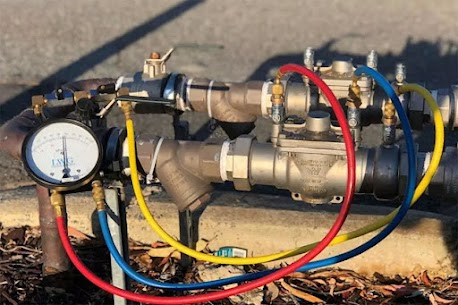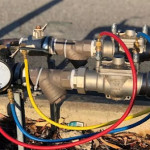Hey there, Raleigh homeowners! Keeping your drinking water clean is super important. One way to do that is by making sure your backflow prevention devices are working properly. Backflow happens when dirty water flows backward into your clean water supply, which can cause contamination.
To prevent this, your plumbing system has a backflow assembly that needs regular backflow testing and maintenance. In this blog post, we’ll share some simple tips to help you avoid failing a backflow test and keep your water safe.
Are you thinking if your water’s as clean as it should be?
If your residential water line isn’t protected by a properly working backflow preventer, you could be at risk of contamination—and failing your next testing Raleigh requirement. A failed backflow test can mean costly repairs, wasted time, and even a potential certification headache.
Think of the peace of mind knowing your meter and backflow prevention system are in top shape, ensuring your family’s water stays clean. Don’t wait for an unexpected issue! Schedule your testing in Raleigh with certified professionals from Water Works Unlimited, Inc. today.
Keep your residential water line safe, protect your meter, and pass your backflow certification with ease!
Understanding Backflow and Its Causes
What Is Backflow?
Backflow is when water flows in the opposite direction, allowing contaminated water to enter your clean water supply. This can happen due to changes in water pressure, causing non-potable water to mix with your drinking water.
Common Causes of Backflow
- Changes in Water Pressure: Sudden drops in water pressure can cause backflow to occur.
- Cross Connections: Points where your clean water supply connects with potential sources of contamination, like irrigation systems or hoses.
- Faulty Backflow Preventers: Devices that are broken or not working properly can fail to stop backflow.
Importance of Regular Backflow Testing
Regular backflow testing ensures that your backflow prevention devices are functioning properly. In Raleigh, NC, local regulations require annual testing to keep your water supply safe and in compliance with the law.
Simple Maintenance Tips to Prevent Backflow Issues
1. Schedule Annual Backflow Testing
Regular testing by a certified backflow tester helps identify and fix issues before they become major problems. It’s a good idea to mark your calendar and set reminders for annual testing.
2. Inspect Your Backflow Prevention Devices
Regularly check your backflow preventers for signs of wear or damage. Look for leaks, rust, or any visible issues that might affect their performance.
3. Keep Areas Around Devices Clear
Make sure there’s enough space around your backflow prevention devices for easy access and maintenance. Remove any obstacles like plants, debris, or other items that might block access.
4. Protect Devices from Freezing
In colder months, insulate your backflow preventers to prevent freezing, which can cause damage. Use insulation materials or covers designed for this purpose.
5. Avoid Creating Cross Connections
Be mindful of how you connect hoses and other equipment to your water supply. Use backflow prevention devices on all connections to prevent contamination.
6. Hire Professional Plumbers for Installations
When installing new plumbing fixtures or irrigation systems, hire professional plumbers to ensure proper installation and compliance with local codes.
7. Educate Household Members
Teach everyone in your home about the importance of backflow prevention and how to avoid actions that could cause contamination.
Common Backflow Prevention Devices
1. Pressure Vacuum Breaker (PVB)
A PVB is a device that prevents backflow by using a pressure-sensitive valve. It’s commonly used in irrigation systems.
2. Double Check Valve Assembly (DCVA)
A DCVA has two check valves to prevent backflow and is suitable for low to medium-hazard situations.
3. Reduced Pressure Zone Assembly (RPZ)
An RPZ provides the highest level of protection with two check valves and a relief valve, ideal for high-hazard situations.
Signs Your Backflow Preventer Needs Attention
- Water Discoloration: If your water looks rusty or dirty, it could be a sign of backflow.
- Strange Tastes or Odors: Unusual tastes or smells in your water may indicate contamination.
- Leaks or Drips: Visible water around your backflow preventer suggests a problem.
- Low Water Pressure: A sudden drop in water pressure can be a sign of backflow issues.
Steps to Take If You Suspect a Backflow Problem
- Turn Off the Water Supply: Prevent further contamination by shutting off the main water valve.
- Contact a Certified Backflow Tester: Reach out to a professional to inspect and repair the issue.
- Avoid Using Water Until Fixed: Don’t use your water supply until the problem has been resolved to ensure safety.
Benefits of Professional Backflow Testing Services
- Expertise: Certified testers have the knowledge to identify and fix issues accurately.
- Compliance: Professionals ensure your system meets local regulations and codes.
- Peace of Mind: Regular testing provides confidence that your water supply remains safe.
Raleigh’s Cross Connection Control Program
Raleigh’s Cross Connection Control Program aims to protect the public water supply from contamination. The program requires annual testing of backflow prevention devices and submission of test reports to the city.
How to Schedule a Backflow Test in Raleigh, NC
- Find a Certified Tester: Look for professionals approved by the city of Raleigh.
- Set an Appointment: Schedule a convenient time for the tester to inspect your system.
- Submit Test Results: Ensure the tester submits the results to Raleigh’s Cross Connection Control Program.
Frequently Asked Questions About Tips to Avoid Failing a Backflow Testing
1. Is annual backflow testing required in Raleigh, NC?
Yes. The city requires homeowners to have their backflow prevention devices tested annually to ensure compliance and safety.
2. Can I perform backflow testing myself?
No. Only certified testers are authorized to perform backflow testing to ensure accurate results and compliance with local regulations.
3. Do I need a backflow preventer if I don’t have an irrigation system?
Yes. Even without an irrigation system, other cross connections can pose risks, making backflow preventers necessary.
4. Can a faulty backflow preventer affect water pressure?
Yes. A malfunctioning backflow preventer can cause changes in water pressure, indicating a potential issue.
5. Is backflow testing expensive?
No. The cost of backflow testing is generally affordable, especially when compared to the potential expenses of dealing with contaminated water issues.
Call Water Works now for maintenance and testing!
Keeping your home’s water supply clean and safe is crucial. By following these simple maintenance tips and scheduling regular backflow testing, you can prevent issues and ensure your water remains uncontaminated.
If you’re in Raleigh, NC, and need professional backflow testing services, contact Water Works Unlimited, Inc. Our certified experts are here to help you maintain a safe and compliant plumbing system. Call us today at (919) 570-7808 to schedule your backflow test.



